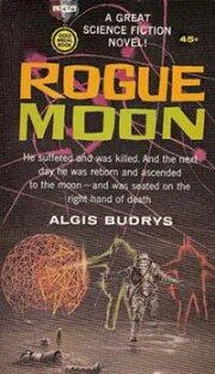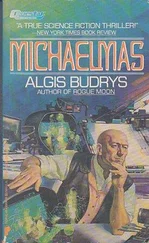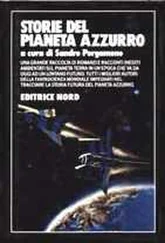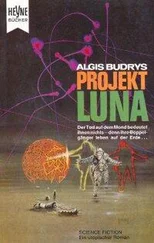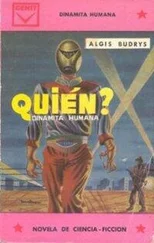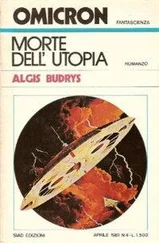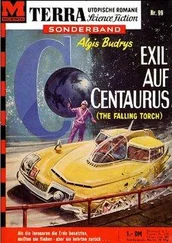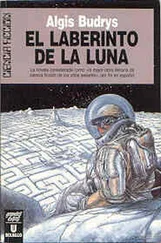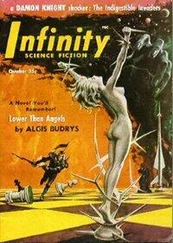“He’ll be right down.” Hawks looked up at the galleries. “I wish I knew Gersten better. He’s a hard man to understand. He never shows more than he has to. It’s very hard to accommodate yourself to a man like that.”
Latourette looked at him peculiarly.
Barker lay on the table, enclosed in the armor suit, with his faceplate open. He looked calmly up as Hawks bent over him.
“All right?” Hawks asked.
“Fine.” Barker’s voice echoed in the helmet and came distorted through the narrow opening. His air hoses lay coiled on his stomach.
The ensign, standing beside Hawks, said, “He seems to be quite comfortable. I don’t think there’ll be any trouble with claustrophobia. Of course, we won’t know until we’ve closed his faceplate and had him breathing tanked air for a while.”
“Son,” Barker said, “I’ve dived more feet in my life than you’ve walked.”
“This is hardly scuba gear, sir.”
Hawks moved into the line of vision between Barker’s face and the ensign’s. He said, “Barker, I told you I was going to give you a chance to back out now, if you wanted to.”
“I like the way you put that, Doctor.”
“The reason we have all this elaborate control gear should be obvious,” Hawks persisted. “The fidelity of the resolving process depends on the clarity of the signal that arrives at the receiver. And even the tightest beam we can drive up to the Moon is going to pick up a certain amount of noise. So we feed from the transmitter here to the amplifier banks, checking the signal against the readings we take on the first scan.
“There’s always a variation between the file tape and the signal, of course. We make a new file tape with every transmission, but there’s stili a time lag between the making of the latest tape and the next transmission of the same object. But that’s why we have a standard man, and a statistical table of the probable degree of variation over given periods of time. By setting up crude analogies in the amplifiers, and introducing the proper statistical factor, we can introduce a certain measure of control.”
“I hope you think I’m following this, Hawks.”
“I hope you try. Now. When we’ve done all this, we have as much accuracy as we can. At that point, the signal is pulsed up to the Moon, not once but repeatedly. Another differential amplifier bank in the receiver there compares each bit of information in each signal pulse to each bit of all the signals it has received. It rejects any bit which differs from a majority of its counterparts. Any error created by transmission noise is almost certain to be discarded in the process.
“What we’re going to do today is scan you for the first time. Nine tenths of our control equipment is useless until it has scan readings to work from. So, the first time, you’re trusting entirely to our ability as electronic engineers, and my skill as a designer. I can’t guarantee that the Al Barker who is resolved in the laboratory receiver will be the same man you are now. You can test an electronic component until you’re blue in the face, and have it fail at the most critical moment. The very process of testing it may have weakened it just enough. And the scanner itself represents a broad departure from the usual electronic techniques for which a broad base of familiar theory is available. I know how it works. But there are places where I don’t yet know why. You have to realize — once the scan is in progress, we can’t correct any errors the hardware may be making. We’re blind. We don’t know which bit of the signal describes which bit of the man. We may never know.
“When Thomas Edison spoke into the horn of his sound reproducer, the vibration of his voice against a diaphragm moved a needle linked to that diaphragm, and scratched a variable line on the rotating wax cylinder. When he played it back, out came ‘Mary had a little lamb.’ But there Edison was stopped. If the needle came loose, or the wax had a flaw, or the drive to the cylinder varied, out came something else — an unintelligible hash of noise.
“There was nothing Edison could do about it. He had no way of knowing what part of a scratch was song, and what was noise. He had no technique for taking a stylus in his hand and simply scratching a cylinder so that it could be played as ‘Mary had a little lamb.’ He could only check his reproducer for mechanical failure and begin, again, with his voice, and the horn, and the diaphragm. There was simply no other way for him to do it. And, of course, he needed none. There is no particularly great expenditure in saying ‘Mary had a little lamb’ over and over again as many times as it may take to get a perfect playback.
“And if Daguerre, experimenting with the beginnings of photography, found a plate overexposed or underexposed, or blotched by faulty chemicals or an imperfect lens, he could usually just try again. It didn’t matter very much if, now and then, a picture was lost because the only way to save it would have been to know something that photography experts are only learning today.
“But we cannot do it, Barker. You are not ‘Mary had a little lamb.’ Nor are you a thing of light and shadow, to be preserved or lost at no critical expense to its source.” Hawks smiled with wan self-consciousness. “A man is a phoenix, who must be reborn from his own ashes, for there is no other like him in the universe. If the wind stirs the ashes into a clumsy parody, then the phoenix is dead f orever. Nothing we know of can bring you back.
“Understand me: the Al Barker we resolve will almost certainly be you. The statistical chances are all on your side. But the scanner can’t discriminate. It’s only a machine. A phonograph doesn’t know what it’s playing. A camera photo… graphs everything it can see in front of it. It won’t put in what isn’t there, and it won’t omit the lipstick smudge on your collar. But if, for some reason, the film has lost its red sensitivity, what comes up on the film doesn’t look like lipstick at all — it might not look like anything. Do you understand what I’m trying to say? The equipment’s set up as well as it can be. Once we have our negative, we get perfect prints every time. But it’s the negative we’re going after now.”
Barker said lightly, “Ever had any trouble, Doctor?”
“If we have, we don’t know it. As far as we could tell, our preliminary scans have all been perfect. At least, the objects and living organisms we’ve dealt with were able to go on functioning exactly as they always had. But a man is such a complex thing, Barker. A man is so much more than his gross physical structure. He has spent his life in thought — in filling his brain with the stored minutiae he remembers and reconnects when he thinks. His body is only a shell in which he lives. His brain is only a complex of stored memories. His mind — his mind is what he does with his memories. There is no other mind like it. In a sense, a man is his own creation.
“If we happen to change him on some gross level that can be checked against whatever is recorded of his life, we can detect that change. But we’re not likely to be that far off. Far more serious is the possibility of there being enough errOr to cause subtle changes which no one could find — least of all you, because you’d have no data to check against. Was your first schoolbook covered in blue or red? If you remember it as red, who could find it now to see what color it was?”
“Does it matter?” Barker shrugged, and the suit groaned on the table. “I’d rather worry about the duplicate being so screwed up that it’s dead, or turned into a monster that needs to die.”
“Well,” Hawks said, wiping his hand over his face, “that’s not at all likely to happen. But you can worry about that if you want to. What you worry about depends entirely on where you draw the line on what parts of you are important to you. You have to decide how much of yourself can be changed before you consider yourself dead.”
Читать дальше
